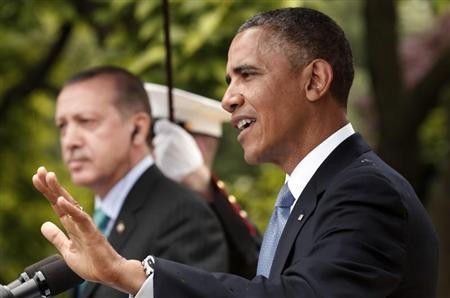
Even when it is not clear on the nature of 'support' the United States will render to the long battered Syrian rebel forces, the fact that the much-awaited support from the most important member of the international community will be available, at least in theory and speeches, comes with many impounding questions.
Why did the US have to act so cautiously only to bring in the use of chemical weapons by Syrian President Basha al- Assad's military as reason on why it would ultimately arm the rebel forces? Did Barack Obama realise that its reluctance to act would be dealt with rather harshly at the upcoming G8 Summit and so he created this diplomatic cover-up to address world leaders?
While the promise of aid from US comes as a surprising turn of events for many, there is scepticism if the decision would even materialise in time or whether help would be enough to empower the rebels with sound military forces. The US is yet to decide what kind of arms and ammunition it would be sent, if they ever decide to.
"What we need, really, is weapons and ammunition, and especially anti-tank and anti-craft missiles," Gen. Salim Idriss of the rebel Free Syrian Army told CNN. But Washington has not yet disclosed if the rebels will get what they are direly in need of or whether the much hyped US response to crossing of the "red line" will not go beyond increasing "the size and scope of the assistance," as Ben Thodes, US deputy national security adviser told reporters.
Suggestions were also made to create a "no fly zone" over Syria which hasn't received an approval from the US, since it is thought to invite major commitment of US and European air power to defy Syria's air defences that are extensive in their presence. Reuters reported citing European officials and others with knowledge about the subject that US will only supply automatic weapons, light mortars and rocket-propelled grenades.
Not undermining the use of these weapons for the battered rebels desperately in need of help, the weaponry will not include the surface-to-air missiles called MANPADs that could fire down Syrian military planes and helicopters. But the hard question Obama is likely to be confronted with at the G8 summit which is only days away is that while the regime forces has been long known to be using every weapon possible, including the chemical kinds against the rebels, would it not be justified to arm the rebels with more powerful ammunition so that they could defend themselves?
Moreover, Iran's Hezbollah group and Russia has been helping the regime for long. Wouldn't it only be wise to give Assad an eye for an eye? It has taken 93,000 deaths in Syria for the US to even realise that they must arm the rebels. How long before the bloodshed stops once and for all?
Follow the writer in Twitter: https://twitter.com/sahaja_gopi
















